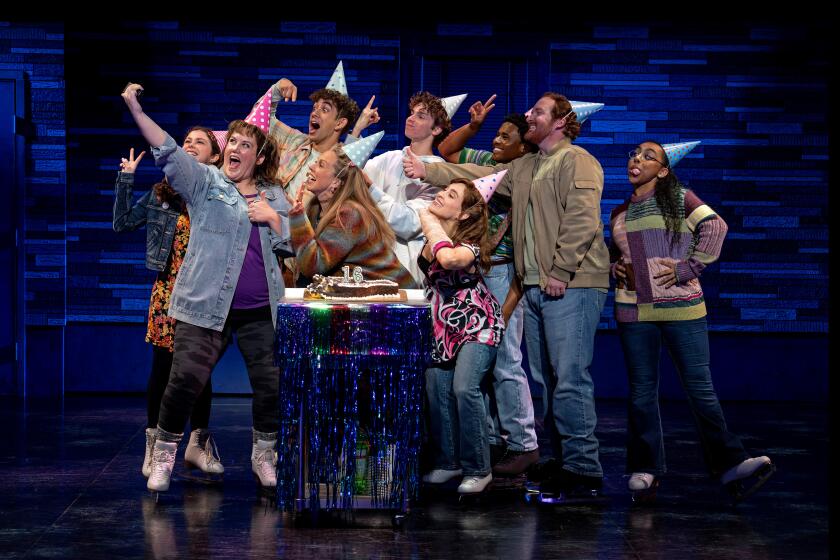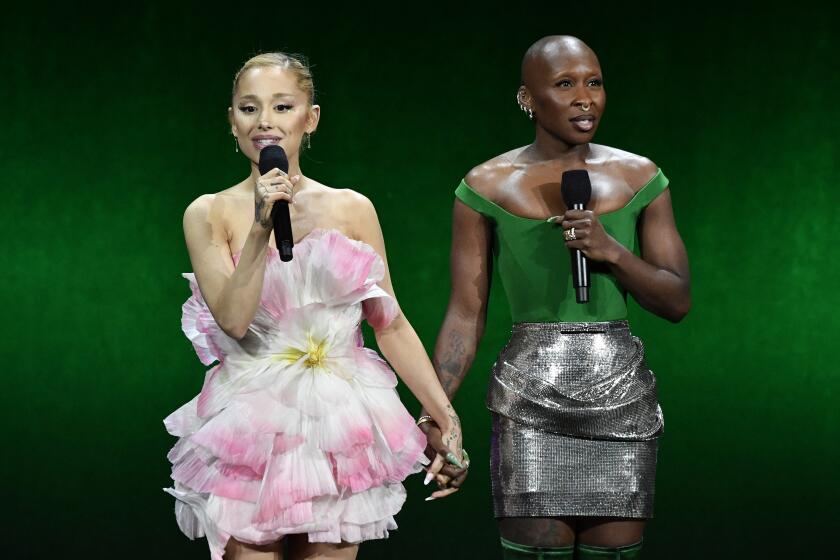Caught Up in the Great ‘Endgame’ : Theater review: Samuel Beckett’s meditation on the end of the metaphoric day resonates with meaningful meaninglessness.
“I could be bounded in a nutshell, and count myself a king of infinite space--were it not that I have bad dreams,” said Hamlet. Hamm, the tattered protagonist of Samuel Beckett’s “Endgame” is the king of that nutshell. He reigns in a concrete basement, in a filthy robe that was once royal red. He is attended by his vexed servant Clov and annoyed by two ancient, dusty parents, Nagg and Nell. They pop up occasionally from the trash bin in which they live, sucking on dog biscuits.
How is it that Beckett can be so bleak and so funny at the same time? This is one of the great mysteries of modern drama, and it is available for contemplation at the Matrix Theatre, where “Endgame,” in all of its weirdly funny glory, runs until July 2.
As usual, the Matrix double-casts the play, reshuffling actors from night to night. If you see the cast I saw, you won’t want it to. Charles Hallahan plays Hamm, whose pompous stateliness is reminiscent of Jackie Gleason, if he were blind, grimy, chair-bound and capable of taking joy from cruelty. With insouciance, he folds a bloody head rag into a hankie, which he pops into his robe pocket. Nothing is flair but thinking makes it so--as Hamlet might have said.
Hallahan’s Hamm is a big, bossy, mean baby of a man, but human, very human. He asks the air, with self-pitying nobility, “Can there be misery loftier than mine?” His rhetorical question gives him pleasure. But the contemplation of his own mortality bores him. He yawns extravagantly. “And yet,” he says, “I hesitate to end.”
Alan Schneider, the original director of many of Beckett’s plays, wrote that “Waiting for Godot” is about an expected arrival that never comes and “Endgame” about a departure that remains only anticipated. For Hamm and the other characters, “Endgame” is the stretch of time, near the end of the metaphoric day, when we wait for death but go on doing our meaningless chores. Yet every tight sentence in the play resonates with meaning. Meaningful meaninglessness: Beckett is the master of this fundamental semiotic paradox.
Schneider called Clov an automaton, but that is not how Gregory Itzin plays him. Lean and expressive, he is Laurel to Hallahan’s Hardy, straining to be patient with his capricious master. His face changes from exasperation to outrage to sudden kindness. Because he can see but can’t be seen by his blind master, his expressions are pure, unadulterated by the expectation of someone else’s perception.
Itzin shows us that Clov’s predicament is actually richer than Hamm’s. He has more to do and more information to process. His load is heavier. Itzin’s rubber face resembles several other great clowns. In the final scene, in his hat and traveling bag, he looks like Ray Bolger. His hesitations have the pregnancy of Buster Keaton’s. There is a classic quality about him.
Director Andrew Robinson also gets a fine, lamenting Nell from Audra Lindley. And Mitchell Ryan is very funny as the crusty old dad Nagg, demanding one minute, cringing and servile the next, coated in dust. The alternate cast features Robin Gammell as Hamm, Allan Arbus as Nagg, Claudette Sutherland as Nell and Cotter Smith as Clov. (A review of this cast will run next week.)
I’m at a loss to describe why Hamm, the blind, mean, fat guy, is so touching. He sits on his decrepit little throne, with a pathetic stuffed dog made out of rags and socks collapsed at his feet, grandly holding a staff, a bloody rag peeking from his pocket. He smells, as Lear said, of mortality. “You’re on Earth, there is no cure for that!” Hamm notes, with perfect accuracy, and with a certain inexplicable satisfaction. It’s true, there is no cure for that. But at least there is Beckett.
* “Endgame,” Matrix, 7657 Melrose Ave., Thur.-Sat., 8 p.m.; Sun., 3 p.m. Ends July 2. $19. (213) 852-1445. Running time: 1 hour, 40 minutes.
More to Read
The biggest entertainment stories
Get our big stories about Hollywood, film, television, music, arts, culture and more right in your inbox as soon as they publish.
You may occasionally receive promotional content from the Los Angeles Times.










